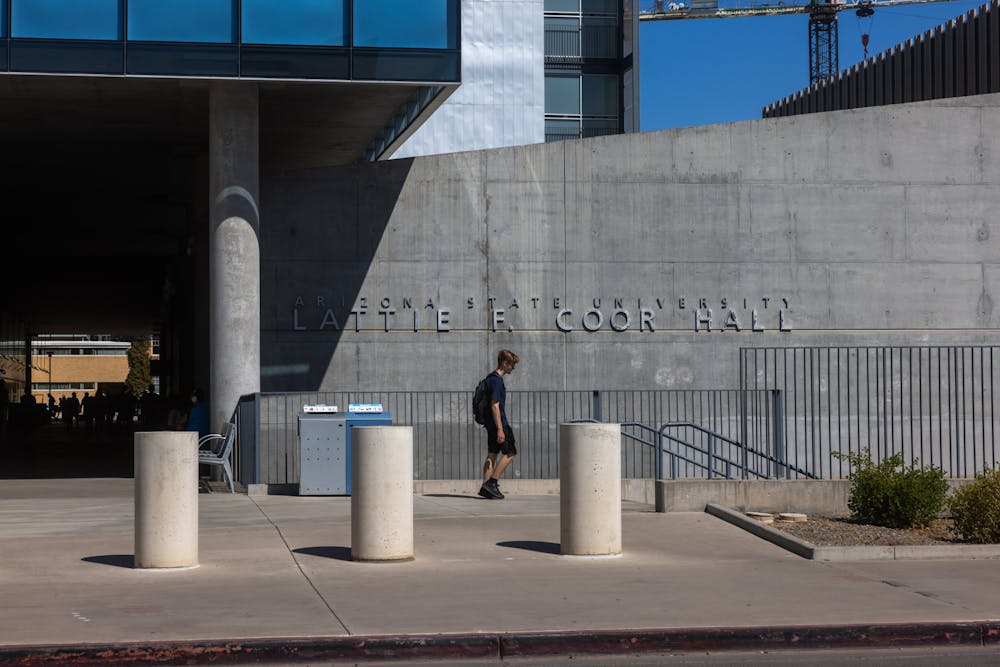The U.S. Department of State announced a new partnership with ASU that supports new student exchange programming in Europe.
Assistant Secretary of State for Global Public Affairs Bill Russo announced the new course, called "Democratic Resilience in the Digital Age" at a round table discussion with ASU faculty and students Monday afternoon. ASU students in the class will have exclusive access to the European Digital Diplomacy Exchange (EDDE) program — tailored to students interested in foreign affairs and strategic communications — starting in Spring 2024.
The course will allow students to work with 21 different European governments on how they can establish and improve their communications to combat disinformation.
According to Sec. Russo, the class will be a hands-on experience where students will plan press briefings, handle government social media accounts and present their work to the partner governments on how they can improve their strategic communications.
Russo said the class presents a great way for students to improve their resumes.
"I think it's going to be a really great opportunity for our European partners to be able to draw on the expertise, the intellect, the capacity of students of faculty here at ASU," Russo said.
Russo said his colleague Matthew Jacobs, an ASU alumnus, connected the State Department with ASU to create more opportunities for students interested in international affairs. Russo said ASU is "fertile ground" for foreign affairs and he hoped the new partnership could attract promising talent to work for the State Department.
"ASU was one of the top five target schools because of the academic background," Russo said. “If these partnerships can develop a pipeline of talent who is interested in foreign policy, that's great for us."
For students like Arnulfo Acedo Jr., a junior studying global studies, the partnership shows that policymaking is not just for the older generation.
"A lot of students, especially young adults, don't feel like the government listens to them," Acedo Jr. said. "But programs like these incentivize students and let them know that their voice matters and lets them know that the government actually wants to include the youth into these discussions."
Jonathan Duprat, a graduate student studying international affairs and leadership, said he supports the partnership because of its potential to help students get their foot in the door in the world of foreign policy.
"I think it's going to help (students) out because it just gives them options to get involved in European politics," Duprat said. "This is more towards the diplomatic side, specifically a digital point of view which is obviously more and more important in our day and age."
While some praise the new partnership, others raise concerns about whether it will undermine ASU's image as an independent institution. Glenn Sheriff, associate professor from the School of Politics and Global Studies, said there is potential that people could perceive the University as the department's "outlet for U.S. diplomat policy."
Russo said ASU's independence as an institution was one of the main selling points for why the University was chosen to partner with the State Department.
"What we are offering here is independent and rigorous research that is not influenced by the U.S. government," Russo said. "We are in many ways a facilitator here."
He said students with a desire to learn about foreign policy, international affairs and communication would do well in the new course, but there is not a "hard skill requirement."
"I think the benefit is that you know, pretty much any university student these days has a degree of sophistication in digital communications, that is appealing to one of these partner governments," Russo said. "You don't necessarily have to be a communications expert or communications major to contribute here."
Edited by Shane Brennan, Alexis Waiss and Angelina Steel.
Reach the reporter at gnavar10@asu.edu and follow @GhadielN on X.
Like The State Press on Facebook and follow @statepress on X.




